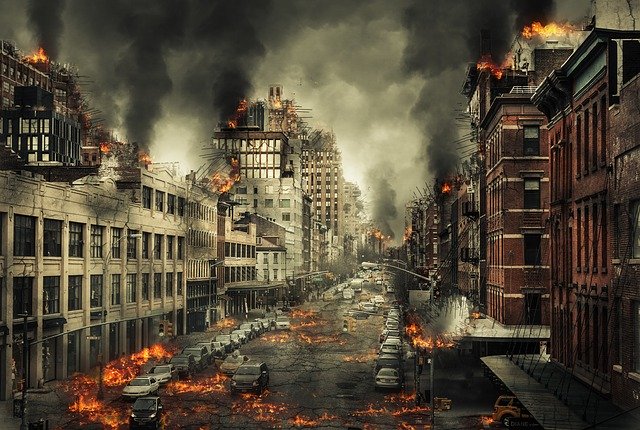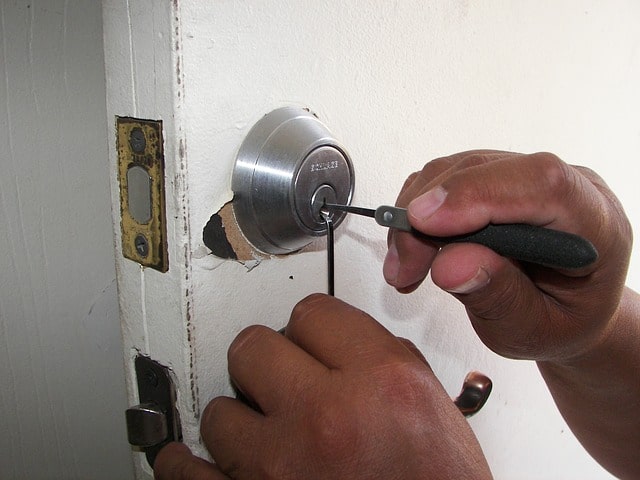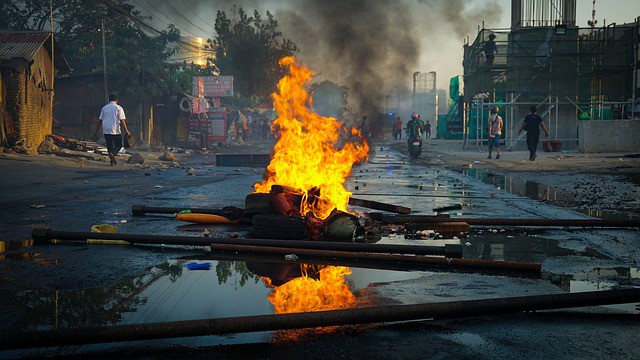Want to brush up on your urban survival skills? Let’s get started!
Major cities around the world occupy a small portion compared to the huge landmass. With more than 80 percent of the population living in such a small portion, it’s quite easy to find yourself in the concrete jungle when disaster strikes.
Since you’ll have to navigate the city every single day, you’ll have to learn how to survive. Developing and improving your urban survival skills will make it easier for you to manage any kind of disaster. Nobody knows when disaster will strike.
Preparing yourself for such a possibility will put you a step ahead of the crowd. And your chances of survival will be high. Today, we are going to discuss some of the urban survival skills that you should develop and improve for the concrete jungle.

1. Blending in An Urban Enviroment
How do you hide where thousands or millions of eyes are everywhere? Since the last thing you want to do is attract attention by doing something out of the ordinary, you will hide in plain sight. Blending in is an art that most people overlook yet critical to your survival in the concrete jungle. Blending helps you avoid being the target of any catastrophe that is taking place.
Foreign invaders, scavengers, and law officials are highly likely to target anyone who catches their attention for some reason. In such a case, it’s best to act like another ordinary person in town. Here are a few tips that will help you blend in:
- Avoid hats – Most people on the streets wear hats thinking that they’ll hide their faces especially when looking down. However, the majority of people around you don’t wear hats. Further, authorities will be on the lookout for anyone who’s wearing a hat after a disaster because they know that such people do this to hide their faces.
- Avoid eye contact – While moving around, avoid eye contact. Eye contact not only makes it easier for you to be confronted but also boosts memory. Being a grey man is all about moving around in public areas with no one realizing you were there.
- Don’t walk too fast – Don’t walk too slow or too fast as this will make you an easy target. Walk like the rest of the people around you to avoid being in the spotlight.
- Cover yourself – A grey man sticks to areas of shadow to cover or hide in case disaster strikes. Avoid walking in places where you are visible to everyone. Instead, stay close to buildings, or natural cover.
- Inspect – Never walk down a street without inspecting it first. Observe the streets with extreme caution and then make your decision. Also, avoid walking too fast or slow to avoid standing out.
2. Lock picking

Big cities are represented by lots of tall buildings. And since every building has a lock, you can imagine the number of locks out there. In normal circumstances, it’s not easy to find yourself picking a lock. “However, when disaster strikes, it could mean the difference between life and death. By developing your lock picking skills and investing in a quality lock picking kit, you’ll easily save yourself,” says Mark Cooper, the security manager at Essay writing service reviews.
3. Self-defense
If you don’t carry weapons during your visit to urban areas, you should consider developing and improving your self-defense skills. However, you should avoid physical confrontations as much as possible. If you have to defend yourself, ensure that you have all it takes to be the winner.
Remember, running away is not a sign of weakness but self-defense especially when you are not prepared to face your opponent. As you walk down the street, always be prepared for violence as it can happen anytime. And most of the time, it won’t be your fault.
4. Wear neutral colors
When it comes to clothing, stick to neutral colors. Avoid bright colors such as red, yellow, pink and orange and tactical colors like camouflage or black.
Bright colors make it impossible to hide while tactical colors make you stand out from the crowd. And this makes people think you’re dangerous. Neutral colors include gray, dark blue and dark green. A simple t-shirt and a pair of jeans will help you avoid being the target,” notices Janice Bierman, the style fashionista at T-shirt Designs Bundle.
5. Scavenging
The best thing about urban areas is abundance. It’s not easy to find a shortage of supplies or materials if you know where to look. Heightening your five common senses will make you extraordinary especially in urban areas. Scavenging is not a skill but a mindset. You develop it by keeping your mind and eyes open to avoid missing out on useful things.
It’s important to keep in mind that scavenging is not looting. For instance, after a hurricane or any kind of disaster, you are going to see people walking out of grocery stores and shops with as many items as their hands can hold. Is this scavenging or looting? Looters survive by taking advantage of others while scavengers take whatever they can to survive after disaster strikes.
Unlike looters, scavengers usually take things that have been discarded by the owners and are unlikely to be missed or used again.
To become a better scavenger, you should work with a team. Working with scouts will help you know some of the areas where people aren’t living and bandits aren’t waiting. There is nothing worse than scavenging for hours only for your supplies to be taken by looters.
As Top essay writing services reports, equipping your team with a radio and binoculars will help you stay in touch with them and discover which areas are compromised or not. If you lose contact with your scouts, you’ll know that something is not right and you’ll send reinforcements. Some of the obstacles that your scouts need to note include ditches, barbed wire fences, high walls and streams to name a few.
Having the local maps will also make it easier for them to study and understand the places that they want to search. Planning route and alternate routes early enough is critical for scavengers to avoid problems along the way.
Some of the best places to scavenge include:
- Automotive shops – You’ll have a better chance of finding the parts that you need especially if your team uses a vehicle regularly.
- Cars – Checking under the seats, trunk, glove box and the parts of the car itself is critical. The battery can be used for power and the wires for insulation. You can use other engine parts on your vehicle.
- Churches – Since scavenging is not stealing, you want to prepare yourself in case the worst happens. Knowing the churches that offer food and other essential items to needy people will help you find what you need in time of need.
- Distribution centers – Distribution centers such as warehouses and grocery stores are some of the best places to find essential items when disaster strikes. While people are running to save their lives, you’ll be filling your car with essentials that will help you survive in the next few weeks before things get back to normal.
- Dumpsites- Dumpsites are not fun at all. But have you ever wondered why most beggars and streetchildren spend most of their time in dumpsites? You can find a lot of great things there including money.
- Government buildings – Most government buildings today are equipped with modern solar panels to save energy and costs. You can use these facilities to back up lighting and get hold of emergency supplies.
- Hospitals – according to Dissertation Today, hospitals usually have a lot of food, clothing, and medicine. Checking all the drawers and closets will help you get what you need easily.
- Houses – People stock their houses with lots of great things that you can use when disaster strikes. If you manage to access a house, check the basement, garage, back yard, and garden.
6. Situational awareness
When you’re surrounded by people, it’s usually hard to process things, especially after disaster strikes. Developing situational awareness and the ability to take in and process things happening around you will help you survive in the concrete jungle.
7. Navigation
When it comes to navigating in urban areas, a lot of people rely on GPS. However, when GPSs stop working, a lot of people will find themselves stranded. To avoid being part of this crowd, take your time to learn how to navigate without aid. Knowing your routes is critical for your urban survival.
8. Escaping riots

The last place you want to be is in the middle of a major riot. According to essay writer and essay paper searches, riots are dangerous and they can quickly get out of control. To avoid riots, do your research before visiting a specific area. Also, knowing alternative routes will increase your chances of survival in the concrete jungle.
9. Driving
If driving through a major city is usually a challenge under normal circumstances, imagine how it’s going to be during or after a major disaster. Developing and improving your driving skills will help you avoid congestions and stressful situations on the road.
10. Communication skills
Improving your communication skills will help you communicate and connect with people especially during the hard times. Remember, listening and body language are all important aspects of communication. By learning how to read body language, you’ll easily avoid disaster.
11. Be aware
Do not let your guard down at any time. Developing your awareness skill involves reading people without staring at them. Also, identifying an exit routes before entering an area will help you defend yourself in case someone confronts you.
12. First aid
After disaster strikes, it’s highly likely that you or your loved ones will get wounded. Knowing how to treat wounds, cuts and bruises will help not only increase your chances of survival in the concrete jungle but also save lives.
13. Conflict resolution
It would be best if we knew when trouble would strike but unfortunately, we can’t. The best thing we can do is being ready for whatever happens and doing whatever we can to avoid it. Knowing how to talk to people and calming them down can help you avoid fights and even death.
14. Hide your valuables
Hide your valuable items such as money, jewelry, and electronics to name a few. Keep these items hidden to avoid being the target for robbers or looters in case disaster strikes. Carrying a backpack over your shoulders signals that you could have a laptop or something valuable. Therefore, have the straps firm around the shoulder to be on the safe side.
15. Don’t take pictures or videos
It’s quite tempting to take pictures or videos when disaster strikes so that you can upload it on your channel or submit the footage to news stations. However, taking pictures or videos makes you stand out. Plus, thugs can take advantage of the situation and rob you.
Conclusion
All these urban survival skills require practice and consistency to become a master. Doing your research before visiting new places and knowing your area well will help you avoid risky situations. It’s important to be aware of your environment and improve your communication skills to calm down people especially when you can’t fight or run away. Also, hiding your valuables and wearing neutral colors will help you avoid unnecessary attention.
